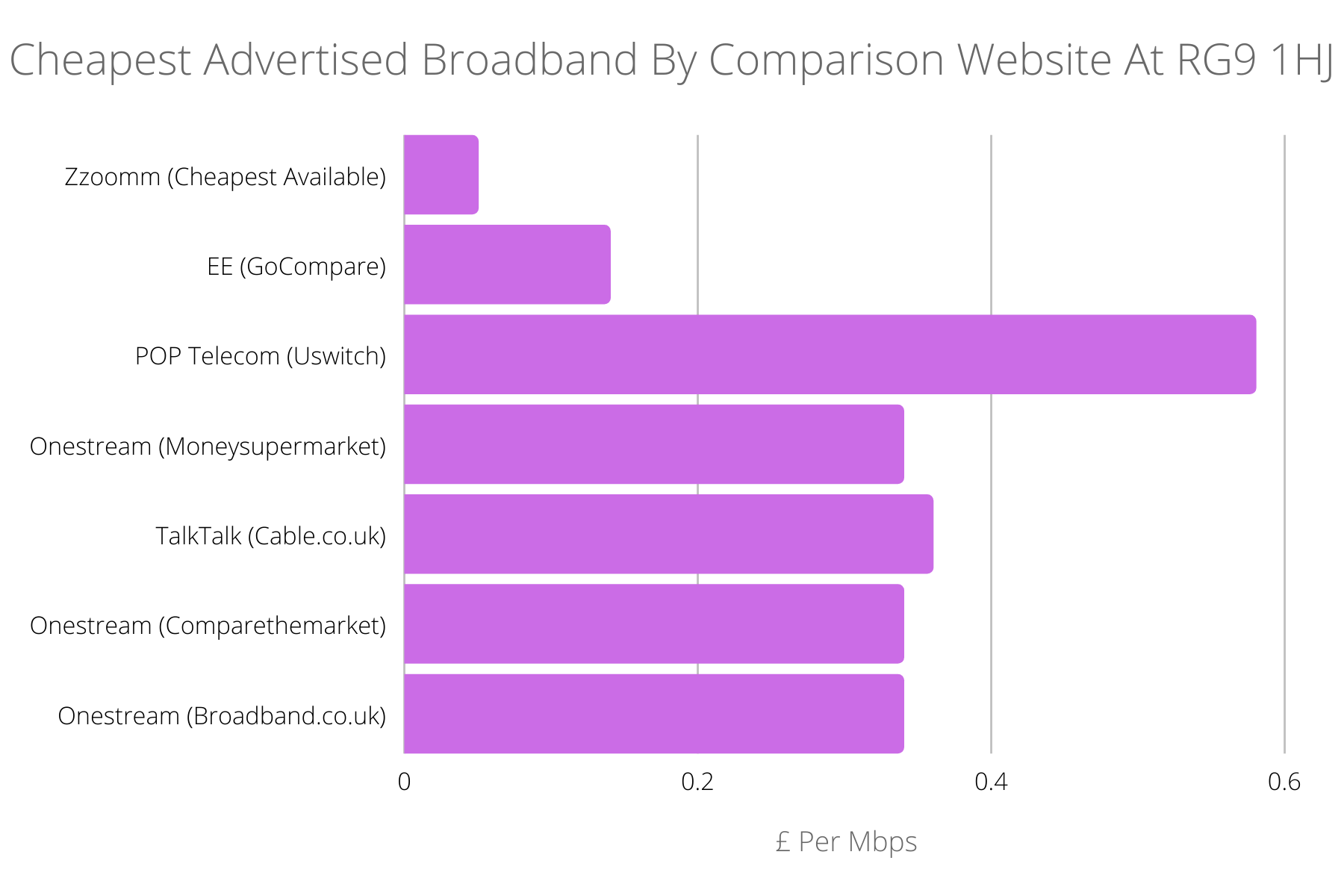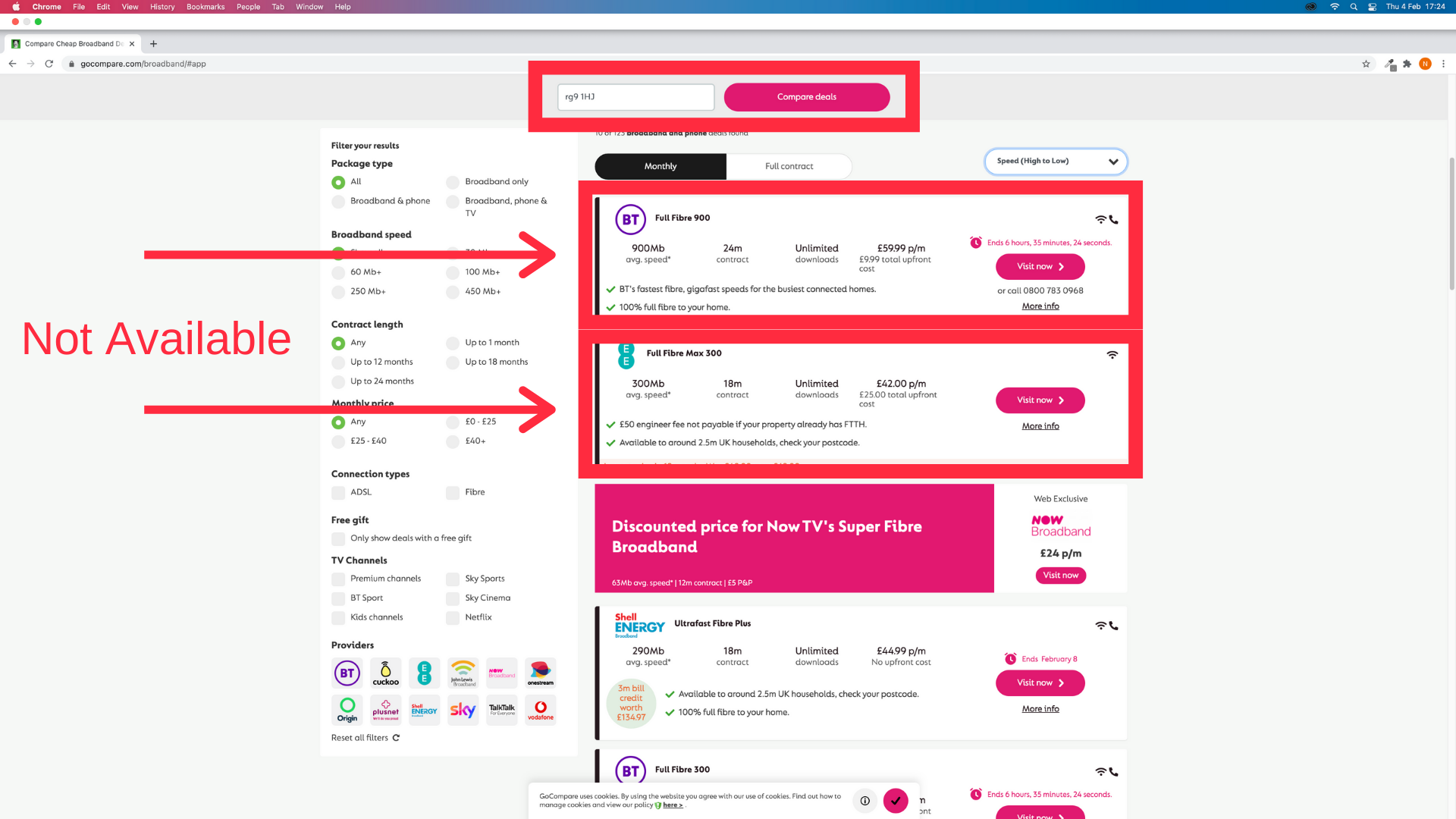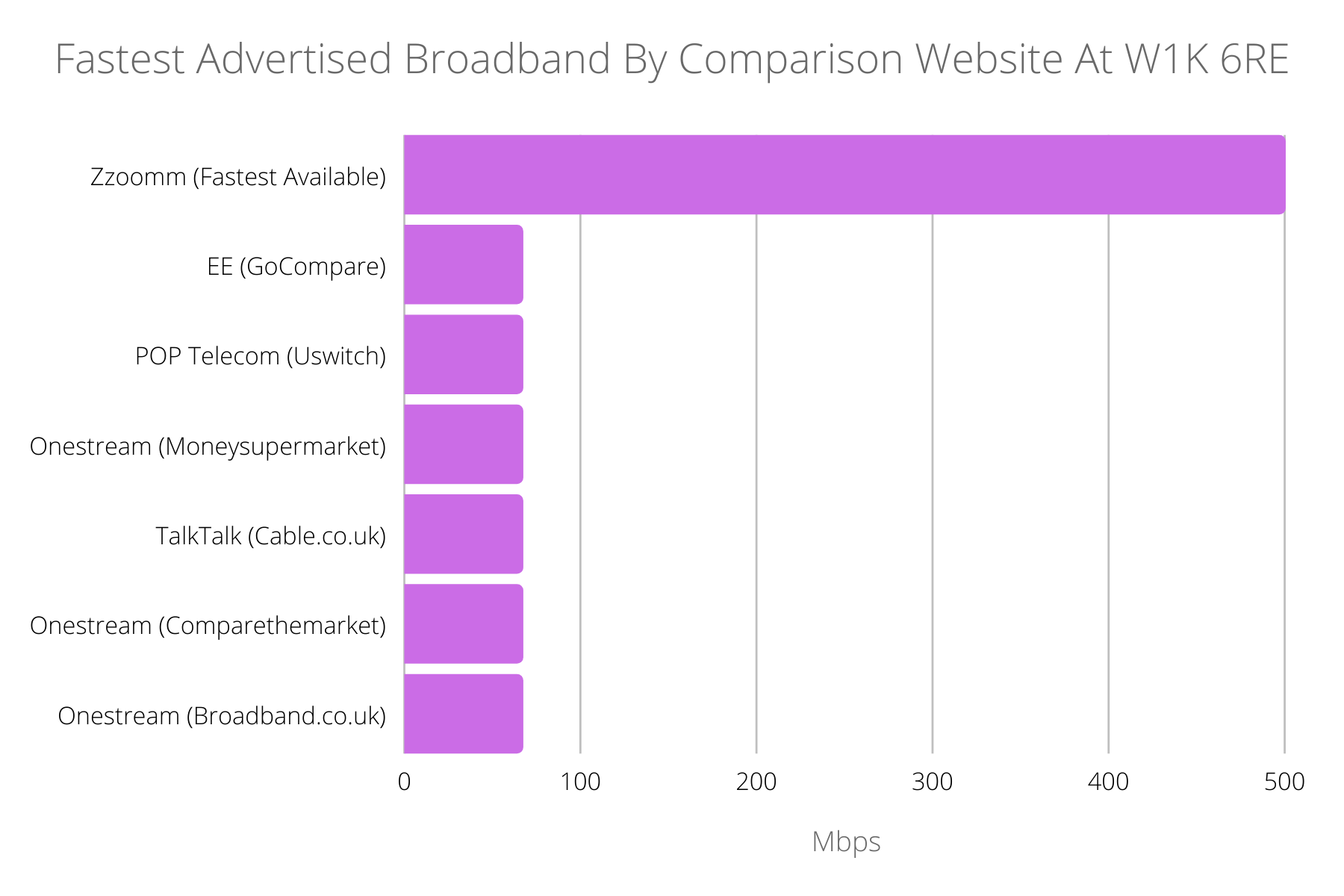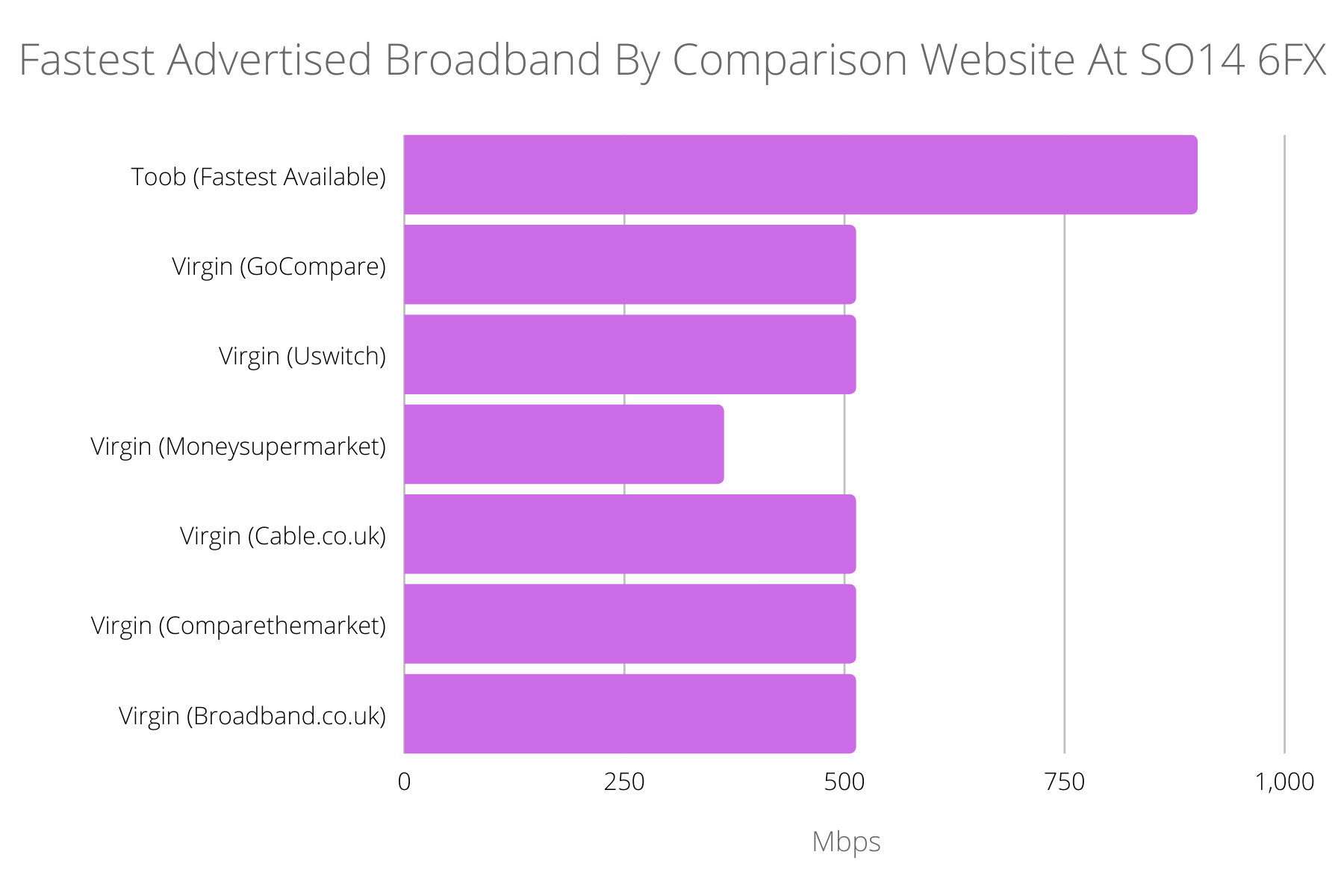Why using a comparison site can lead to more expensive broadband
Recent research from Which! (1) has shown that price comparison websites produce false results for many car insurance customers. How and why this happens is a function of how comparison sites work, and why anyone wanting to compare any product should be very wary of which site they trust.
Unfortunately, Compare Fibre has discovered that some customers searching for the best broadband services are getting false results. The Compare Fibre research team analysed the price and speeds of broadband offers across the UK using the market-leading broadband price comparison sites. The analysis considered several data points, the fastest Internet service, the cheapest Internet service, and then services that would deliver a minimum of 100Mbps, 300Mbps and 500Mbps speeds.
A snapshot of the data is available below, and some of the results were shocking, but worse than that, some results were just wholly misleading.
How comparison sites pay for themselves
To understand what appears to be going on, we need to start by understanding the website comparison business model. Broadband comparison websites operate on the same principle as all other comparison sites. Comparison sites do not sell a product they have made; and so are not, therefore, online retailers.
If price comparison sites are neither online retailers nor market disruptors, what are they and how do they earn money?
Comparison sites should choose the most suitable product according to your criteria. Saving you time and narrowing the purchasing decision for you. They pay for themselves by collecting affiliate commission for every product sold. If you choose a particular product on their website, then they earn up to £100 for the conversion.
Very much like a marketplace, users can choose from an array of products and services. Personalised criteria help the comparison site guide the user to select the best option for themselves. Although comparison sites market themselves as being in the consumer’s best interest, there are differences in commission levels that suppliers will pay for that conversion. Different broadband commissions range from £5 to £100. Therefore, the devil’s advocate could argue that it is in the comparison site’s interests to ensure that they promote the products they get paid most handsomely on.
Do comparison sites help?
When individuals or businesses want to find the right product for their needs and wants, they are grateful for any help they can get; this is true when comparing broadband providers or any other kind of non-tangible product. The fact is that most people do not understand much of the technical detail behind how broadband works, let alone the differences in how broadband arrives at the home or business. The UK broadband market is fast-moving, fragmented and has 100s of providers. It isn’t straightforward, and comparison sites can help consumers make the best value choices.
Most people have a basic set of criteria. Consumers want to know how fast it is, how reliable it is, and its costs. Comparison sites and tools have filter buttons to compare by different criteria; a prevalent one is the lowest to highest price filter. After price, other aspects such as speed, length of contract and connection fee will come into the customer’s calculations.
Getting the best broadband deal relies on the fact that a comparison site displays and compares all suitable products of the same kind. If it does not, the whole concept of a comparison website loses its value; potential customers will then have to do their own research, find out precisely who provides services they need in their area and look them up individually. Research, of course, takes time and effort; ‘something that comparison website publishers assume the modern consumer isn’t keen on “wasting”.
Muddying the waters
Of course, it would be somewhat unfair for a broadband comparison website to omit providers who offered a better deal, simply because they are not signed up to pay that site a fee when a customer “converts”. Unfortunately, precisely this kind of bias is happening today.
It is often the case that one fibre broadband provider is the best value for people living in a particular postcode. Excluding providers who don’t pay a commission means that consumers do not see every available deal. Compare Fibre has discovered many UK locations where consumers are not getting complete information on broadband availability in their area.

In Reading RG9 1HJ, Zzoomm (an alternative network) offers the fastest broadband at 2000Mbps – Uswitch, Moneysupermarket, GoCompare, Cable.co.uk, Broadband.co.uk and Comparethemarket, all offer slower services and omit Zzoomm. The quickest deal on offer from these websites is from Gocompare which publishes EE with a speed of 300Mbps (which isn’t available to order, and we’ll deal with later).

When looking at the broadband cost in RG9 1HJ it’s useful to compare relative offerings using price per Mbps. The cheapest offering is Zzoom 2000Mbps which works out at £0.05/Mbps. Gocompare offers EE at £0.14/Mbps, Moneysupermarket, Comparethemarket and Broadband.co.uk offer Onestream at £0.34/Mbps. Cable.co.uk offer TalkTalk at £0.36/Mbps and most expensive is Uswitch promoting POP Telecom at £0.58/Mbps. Amazingly the cheapest offering from Zzoomm does not feature on the leading price comparison sites, and the most expensive offering is more than 11 times more costly than Zzoomm.

Gocompare also published two false results at RG9 1HJ – customers using Gocompare would see that 900Mbps BT fibre and 300Mbps EE fibre are available. When Compare Fibre checked EE’s and BT’s websites, these products are not available. The search could lead to some users accidentally signing up for products which aren’t as fast as they thought, or just buying whatever is on offer out of sheer exasperation.

At W1K 6RE the fastest available speed is 500Mbps from another alternative network, G.Network costing £0.10/Mbps. The leading price comparison sites fastest speed was 67Mbps costing £0.36/Mbps a whopping 3.5 times more expensive per Mbps.
The Compare fibre research team identified a growing trend: the alternative network providers offer amazing deals where they have network coverage, but price comparison sites aren’t promoting (or being paid for) these deals. Alternative networks want revenue, but their business’s marketing side isn’t offering affiliate deals, the manna of price comparison sites. The net result is consumers could be missing out.

Case in point when comparing broadband options in Southampton at postcode SO14 6FX. Here the alternative network Toob has been building out a full-fibre to the home network (FTTH). The fastest speed offered is 900Mbps for an amazing £25.00 / month or £0.027 per Mbps.

The leading price comparison sites are all promoting Virgin fibre broadband in this area. The fastest promoted service is 512Mbps from £42.00/month or £0.082/Mbps that’s three times more expensive per Mbps.
We’re sure you get the picture by now.
Getting the right deal is a postcode lottery.
Compare Fibre has uncovered 100s of missing broadband deals. In some extreme cases, figures given on comparison sites do not correspond to the service on offer. If the provider themselves published such information, they would be liable to legal action; for a comparison site, the advertisement is just an error.
Coronavirus and comparison sites
Of course, since March 2020, millions of people suddenly have plenty of time, which can be the enemy of comparison websites. It may be that having learned how to make fair use of their time, internet users have discovered the benefits of doing things for themselves. Research is a useful way to pass the hours and gives a gratifying feeling at the end of a productive search. Considering the traffic growth of leading broadband comparison sites though, this doesn’t seem to be the case. The research suggests consumers are relying on a comparison search for 12 month broadband deals more than ever.
Prolonged periods of lockdown and a reliance on the internet have also highlighted the importance of having reliable, fast and secure fibre broadband, often for 24 hours a day. It could well be that those who are now finding themselves working from home or homeschooling will be regretting choosing one provider over another because the monthly fee was two or three pounds cheaper.
Conclusion
Underlining all of this comparison activity is the fact that people love a bargain. For something as essential as broadband, many family members and business owners must remember that the best deal can be much more than just paying as little money as possible. It’s also worth checking any recommended service a price comparison site suggests. Check for local alternative networks and the national operators, as often the alternative networks offer the best speed and price. Time and time again, we’ve witnessed G.Network, Toob, Zzoomm, Jurassic Fibre and many more alternative networks offer stellar deals omitted from the leading broadband comparison websites. When making a broadband comparison, speed, reliability and customer service can be much more critical in determining value than just the monthly cost.
Sources
1 – https://www.which.co.uk/news/2019/09/why-using-a-comparison-site-can-lead-to-pricier-car-insurance/
2 – Data used was collated directly from Uswitch.com, Gocompare.com, Moneysuperkarket.com, Broadband.co.uk, Cable.co.uk and Comparethemarket.com – all data was collated during January 20th 2021 and February 5th 2021 and was correct at this time period.
